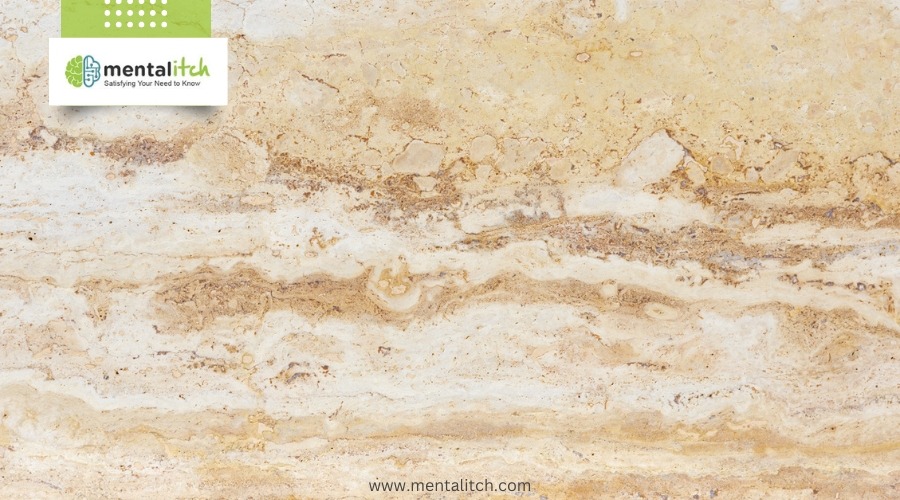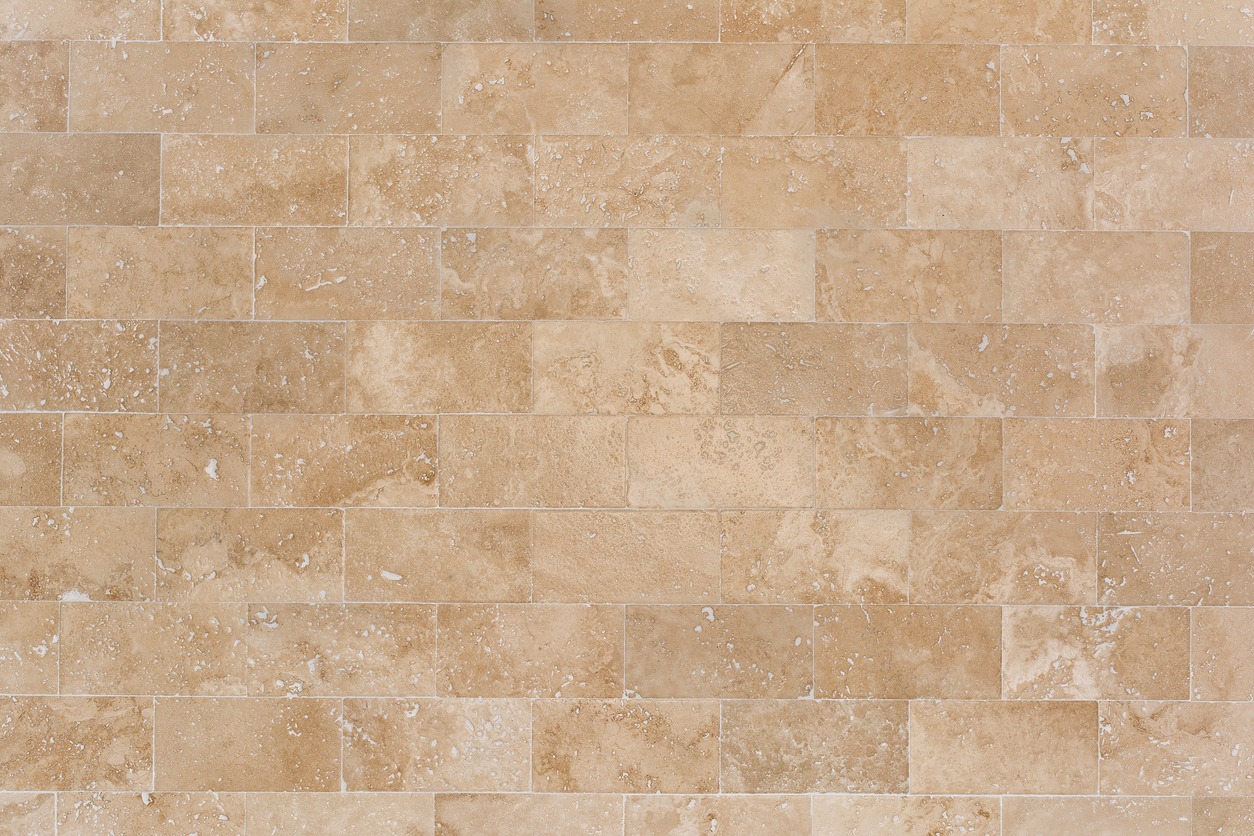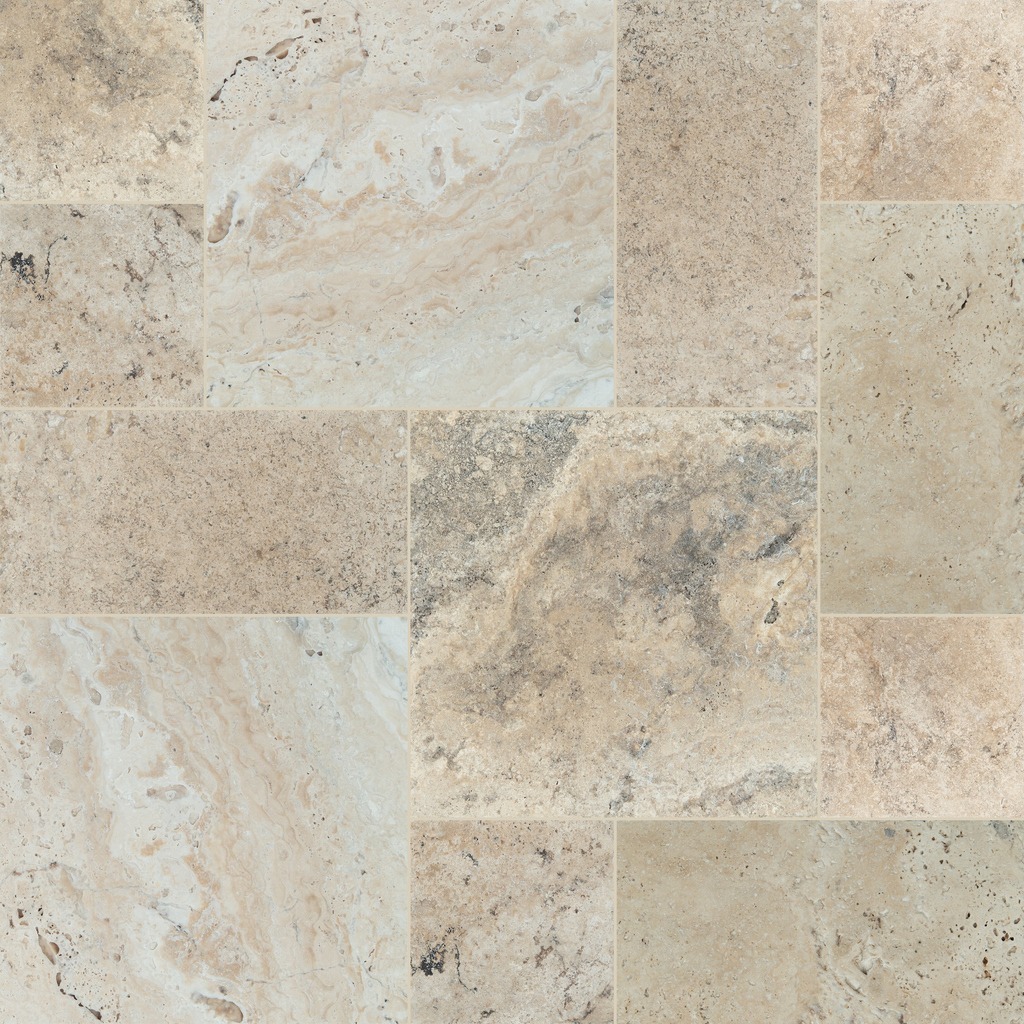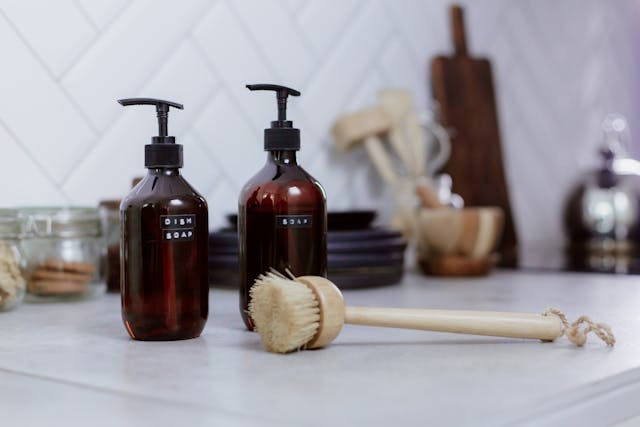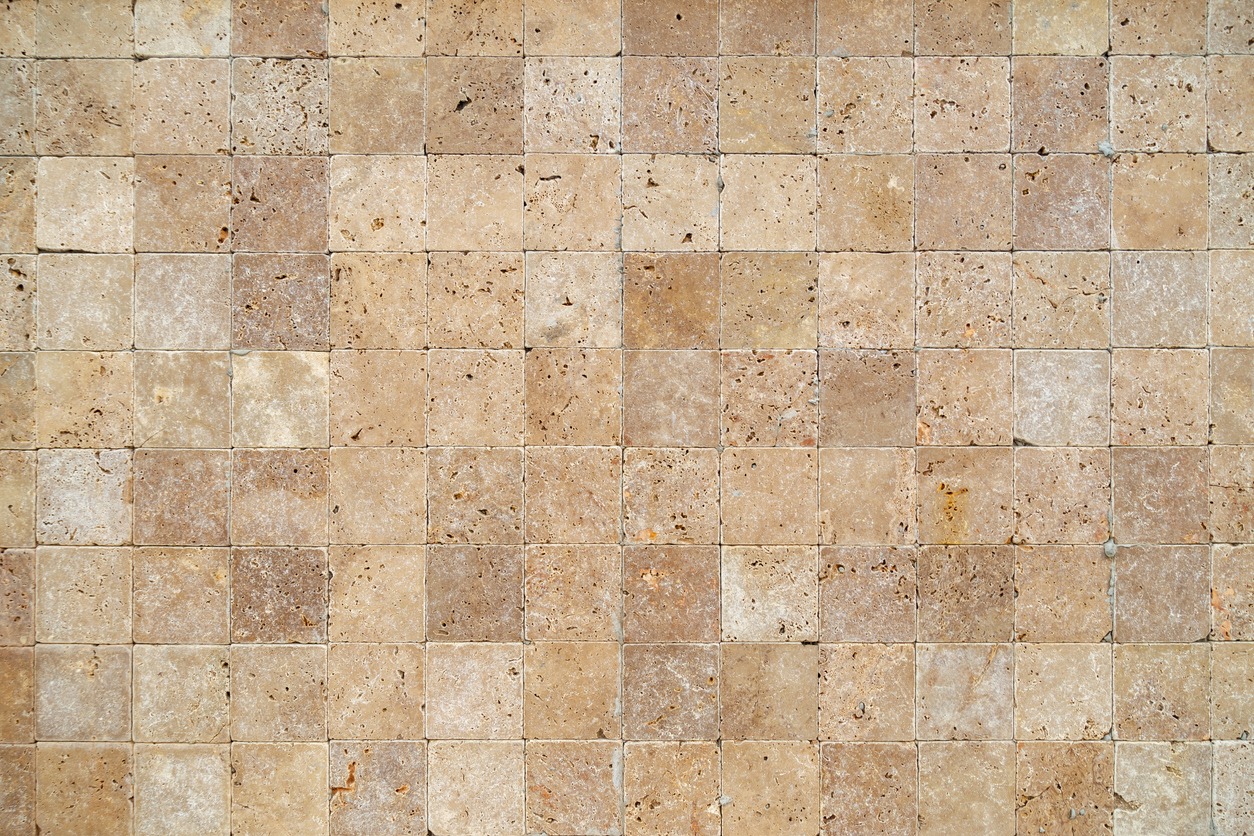Just as you’re admiring the natural beauty of your travertine tiles, you might notice they’ve lost some of their lusters. You’re not alone in facing this challenge. Maintaining the elegance of travertine requires a gentle touch and the right approach.
You’ll need to steer clear of harsh chemicals and acidic cleaners that can etch or damage the surface. Instead, opt for mild, stone-safe products and some simple, preventative measures to keep your tiles looking pristine.
But how do you tackle stubborn stains or protect your tiles from everyday wear and tear without compromising their natural charm? The key lies in a few expert tips and tricks that can transform your maintenance routine and ensure your travertine remains as captivating as the day it was installed.
Understanding Travertine
Travertine, a versatile sedimentary stone made primarily of calcium carbonates, comes in a variety of colors such as white, beige, chestnut, pink, and red, showcasing its wide application for both indoor and outdoor settings. Its durability and low density make it an ideal choice for flooring, countertops, and wall coverings.
However, understanding the proper cleaning and maintenance techniques is crucial to preserving its natural beauty.
As a natural stone, travertine requires regular care to prevent staining and etching. Sealing it upon installation and periodically thereafter can protect its porous surface from spills and stains. When it comes to cleaning, you’ll want to avoid acidic cleaners that can damage the stone. Instead, opt for pH-neutral solutions specifically formulated for natural stone. Gentle, daily sweeping or vacuuming can prevent dirt accumulation, which might scratch its surface.
For deeper cleaning or restoration, honing and polishing might be necessary. These processes can remove scratches and restore the stone’s original shine. Honing gives travertine a matte finish, while polishing results in a glossy surface.
Regular maintenance, including proper cleaning, sealing, and occasional honing or polishing, ensures your travertine surfaces remain beautiful for years to come.
Types of Travertine Finishes
When choosing the right finish for your travertine tiles, it’s essential to understand the unique appearance and texture each option brings to your space. Travertine tiles come in a variety of finishes, each with its own charm and utility. Here’s a brief overview:
- Polished: These tiles boast a glossy surface that reflects light, dramatically enhancing the elegance of your area. It’s perfect for spaces where you’re aiming to create a bright and luxurious atmosphere.
- Honed: Known for its smooth matte finish, honed travertine is the go-to choice for a subtle yet sophisticated look. It provides a flat, low-sheen surface that’s ideal for floors and high-traffic areas.
- Tumbled: Tumbled travertine tiles offer rounded edges and a weathered, rustic charm. Their textured, non-slip surface makes them suitable for outdoor settings or areas with moisture.
- Brushed: With a textured surface that’s achieved by brushing the tile with a wire brush, brushed travertine offers a natural, earthy look. It’s perfect for adding character and depth to your space.
Each of these finishes contributes a distinctive feel to your environment, making it vital to select the one that aligns with your aesthetic preferences and functional requirements.
Safe Cleaning Products
Now, let’s talk about safe cleaning products you should use on your travertine tiles.
You’ll find that recommended neutral cleaners and homemade solutions are your best bet to avoid damaging these delicate surfaces.
It’s crucial to steer clear of harmful chemicals that can erode the beauty and integrity of your tiles over time.
Recommended Neutral Cleaners
To ensure your travertine tiles remain pristine, it’s crucial to select neutral cleaners specifically formulated for natural stone. These cleaning products are vital for the proper care of your tiles. They’re safe for natural stone, ensuring your efforts to maintain travertine don’t lead to damage. With proper cleaning, you can keep your tiles looking as good as new.
- pH-Balanced Stone Soap: Ideal for routine maintenance.
- Mild Liquid Dish Soap: Dilute with water for a gentle clean.
- Stone-Specific Neutral Cleaner: Designed for the unique needs of travertine.
- Microfiber Mop Solution: Perfect for daily dusting and light cleaning.
- Enzymatic Cleaner: Best for organic stains, ensuring deep but safe cleaning.
Using these products will help you keep your travertine surfaces beautiful without risking damage.
Homemade Solutions Guide
You’ll find that creating safe, effective homemade cleaning solutions for your travertine tiles is both simple and affordable. A mixture of warm water and mild dish soap can gently clean your tiles without risking damage.
For those pesky stains, a paste made from baking soda provides a gentle, natural solution. When it comes to disinfecting, diluting hydrogen peroxide with water offers an excellent way to keep your travertine surfaces clean and safe.
These homemade solutions not only ensure the maintenance of your travertine tiles but also stand as a cost-effective and eco-friendly alternative to store-bought cleaners.
Avoiding Harmful Chemicals
While homemade solutions offer a natural way to clean travertine tiles, it’s crucial to select ingredients that won’t harm these surfaces. Using the right products preserves the beauty and integrity of your tiles.
Safe options include mild soap and water, ideal for daily cleaning.
pH-neutral cleaners are a must-have for maintaining the tile’s finish without causing damage.
Opt for specifically formulated stone cleaners that cater to travertine’s needs.
Avoid acidic substances like vinegar or citrus-based cleaners, as they can etch the surface.
Regularly use a dry mop to keep dirt and debris at bay, preventing scratches.
Always check product labels to ensure they’re safe for natural stone, keeping your travertine tiles looking pristine.
Products to Avoid
When cleaning your travertine tiles, it’s crucial to know that certain products can do more harm than good. Although you might think any cleaner is suitable for your beautiful stone floors, this isn’t the case. Acidic cleaners, such as vinegar or lemon juice, are a big no-no. These substances can etch the surface of your travertine, leaving permanent damage that’s difficult, if not impossible, to reverse.
Similarly, abrasive cleaners or scrubbing tools should be avoided. They can scratch or dull the shiny finish of your tiles, robbing them of their natural beauty. Even though you’re aiming for a thorough clean, using these harsh methods will only backfire.
It’s also wise to steer clear of oil-based cleaners or wax-based products. Not only do they create a slippery hazard, but they also attract dirt and grime, making your cleaning efforts counterproductive. And while high-pressure steam cleaners might seem like a powerful cleaning solution, the intense heat and pressure they exert can harm the integrity of your travertine tiles. So, it’s best to avoid these products to keep your tiles in pristine condition.
Regular Maintenance Tips
To keep your travertine tiles looking their best, regular sweeping or vacuuming is essential for removing dirt and debris that can scratch the surface. Care for your natural stone surfaces doesn’t stop there, though. Here are a few more tips to ensure your travertine remains stunning:
- Use a dry mop after vacuuming to pick up any leftover dust and give your tiles a gentle polish.
- Opt for a neutral pH cleaner specifically designed for natural stone when you need a deeper clean. This ensures your travertine won’t suffer from the harsh chemicals found in many common household cleaners.
- Wipe up spills immediately. Travertine is porous and can stain easily if spills are left unattended. Quick action can prevent permanent damage.
- Place rugs or mats at entryways and in high-traffic areas. This can significantly reduce the amount of dirt and debris that comes in contact with your tiles, minimizing wear and tear.
- Avoid acidic substances and abrasive cleaners, including vinegar, on your travertine tiles. These can etch or scratch the surface, diminishing its natural beauty.
Sealing Your Travertine
Now that you’re familiar with regular maintenance, it’s crucial to understand the importance of sealing your travertine. Sealing not only protects your tiles from staining and moisture but also makes them easier to clean.
We’ll guide you through choosing the right sealant and applying it effectively to ensure your travertine stays beautiful.
Importance of Sealing
Sealing your travertine tiles is a crucial step in ensuring they resist stains from common spills like wine and oil, thereby preserving their beauty and durability. By creating a protective barrier, sealing not only enhances the durability of your tiles but also simplifies maintenance efforts. Remember, the right sealing procedure shields the natural pores of travertine, making it less susceptible to staining and easier to clean.
Here’s why sealing is indispensable:
- Prevents staining from liquids
- Enhances durability and longevity
- Protects travertine’s natural pores
- Different types of sealers are available for specific needs
- Regular resealing maintains the protective barrier
Don’t skip this vital step; ensure your travertine surfaces are well-sealed for their protection and your peace of mind.
Sealant Application Tips
Applying a high-quality sealant is your first step toward ensuring your travertine tiles remain protected from stains and moisture. For the best results, opt for a penetrating sealer specifically designed for natural stone. This type of sealer dives deep into the tile, providing a barrier that shields against both staining and moisture penetration.
Remember, sealant application isn’t a one-time task. To maintain the beauty and durability of your tiles, you’ll need to reapply the sealer annually. This routine sealing keeps your tiles looking pristine and makes them easier to clean and maintain over time.
Dealing With Stains
To effectively tackle stains on travertine tiles, start by applying a gentle baking soda paste. This simple, yet effective method helps you clean travertine without the risk of damaging its delicate surface. Here’s how you can keep your tiles looking pristine:
- Avoid Harsh Chemicals: Always steer clear of acidic cleaners or any harsh chemicals. These can etch or damage the surface of your travertine tiles, leading to more significant issues than the stain itself.
- Blot Spills Immediately: Don’t let spills sit. Blot them up as soon as they happen with a soft, clean cloth. This prevents the spill from seeping deeper into the tile and making the stain harder to remove.
- Regularly Seal: Applying sealant to your travertine tiles can significantly reduce the risk of staining. Sealed tiles have an extra layer of protection that helps keep spills on the surface, making them easier to clean up.
- Use Baking Soda Paste: For mild stains, a paste made from baking soda and water is your best friend. Gently apply it to the stain, let it sit, then rinse off with water.
- Seek Professional Help: If you’re faced with a stubborn stain that won’t budge, it’s time to call in the professionals. Sometimes, DIY methods just aren’t enough.
Damage Prevention
After exploring how to tackle stains on travertine tiles, it’s crucial to focus on preventing damage to keep them looking their best. Damage prevention starts with everyday habits. Use coasters under drinks and placemats under dishes to prevent spills and stains from setting in. If accidents happen, clean spills immediately to avoid permanent marks.
For safe stain removal, a simple baking soda paste can be your go-to solution, effectively lifting stains without harming the tiles. It’s tempting to resort to harsh chemicals or abrasive tools, but these can do more harm than good. For stubborn stains that won’t budge, it’s wise to seek professional help rather than risk further damage.
Don’t underestimate the power of regular sealing. Doing this once a year can significantly enhance your travertine tiles’ durability and resistance to moisture. While DIY solutions have their place, professional honing and polishing services offer the best results in maintaining the aesthetic appeal of your tiles. These services can revive the shine and ensure your tiles remain in top condition, steering clear of any urge to fix issues on your own.
Professional Care Recommendations
Turning to professional care for your travertine tiles can significantly boost their longevity and beauty. While regular home upkeep is essential, enlisting the help of expert stone technicians takes the cleaning and maintenance of your travertine floors to another level. These professionals possess the necessary knowledge and tools to ensure your floors aren’t just clean, but also well-protected against the wear and tear of daily life.
Opting for professional care offers several benefits:
- Prevent Damage: Experts use proper cleaning methods that prevent staining and deterioration, preserving the integrity of your tiles.
- Extend Lifespan: Regular professional maintenance can significantly extend the life of your travertine floors, ensuring they remain a stunning feature of your home for years.
- Enhance Durability: With the right care, the durability of your travertine tiles is enhanced, making them more resistant to everyday challenges.
- Restore Beauty: Professional services can restore the natural beauty of your travertine, making them look as good as new.
- Optimal Results: Trusting experienced professionals guarantees optimal results, ensuring the long-lasting beauty of your tiles.
Relying on professional care for your travertine floors not only helps prevent damage but also extends their lifespan and keeps them looking beautiful.
Additional Details
- Be sure to check out more options on how to use travertine tiles
Conclusion
Keeping your travertine tiles stunning is simpler than you might think. Stick to mild, stone-friendly cleaners and dodge acidic products that can harm. Dust mop regularly and use minimal water for upkeep. Don’t forget to seal your tiles annually to shield them from moisture. For those stubborn stains, try a baking soda paste, but for deeper cleans, it’s wise to call in the pros.
By following these steps, you’ll ensure your travertine remains beautiful and durable for years to come.
